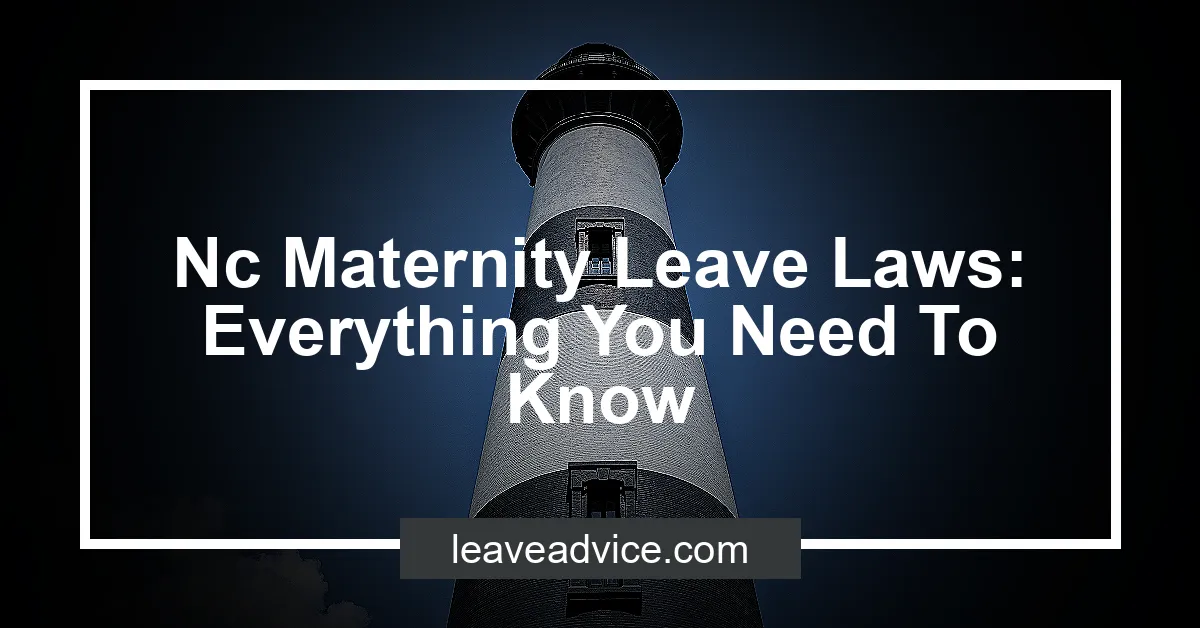Nc Maternity Leave Laws: Everything You Need To Know


In North Carolina, maternity leave is governed by various laws and regulations that aim to provide support and protection for new parents. It is essential for both employers and employees to understand these laws to ensure compliance and to create a supportive and inclusive work environment. In this article, we will delve into the details of maternity leave laws in North Carolina and provide a comprehensive guide for both employers and employees.
How Long Is Maternity Leave in NC?
Maternity leave duration in North Carolina is determined by different factors and laws. The two primary laws governing maternity leave in the state are the Family and Medical Leave Act (FMLA) and the Parental Leave Policy (PPL).
Under the FMLA, eligible employees can take up to 12 weeks of leave in a 12-month period. This leave can be used for various reasons, including the birth or adoption of a child, caring for a spouse, child, or parent with a serious health condition, or dealing with one’s own serious health condition. However, it’s important to note that FMLA leave is unpaid.
On the other hand, the length of leave under the PPL depends on the specific circumstances and is determined on a case-by-case basis. Employees who give birth are entitled to eight weeks of leave within a 12-month period for recovery and family bonding. This leave is also unpaid.
Eligibility for Maternity Leave in NC
To be eligible for maternity leave in North Carolina, employees must meet certain criteria set forth by the FMLA. These criteria include:
-
Worked for the employer for at least 12 months: Employees must have worked for their employer for a minimum of 12 months to be eligible for FMLA leave. These months need not be consecutive but should have occurred within the past seven years.
-
Worked at least 1,250 hours during the previous 12 months: To qualify for FMLA leave, employees must have worked for a minimum of 1,250 hours during the 12-month period preceding their leave.
-
Worked at a covered employer: The FMLA applies to employers who have 50 or more employees within a 75-mile radius of the worksite. Employees must work at a qualifying employer to be eligible for FMLA leave.
It’s important to note that FMLA leave is job-protected, meaning employees have the right to return to their position or an equivalent position with the same pay, benefits, and conditions of employment after their leave expires.
Maternity Leave Benefits for State Employees
In addition to the FMLA, North Carolina also provides specific benefits for state employees who give birth. Eligible state employees are entitled to eight weeks of paid leave to recover from childbirth and bond with their newborn. This paid leave is a significant benefit for state employees, as it allows them to prioritize their health and the well-being of their newborn without financial stress.
Continued Employment for Pregnant Employees
Pregnant employees in North Carolina are entitled to continue working as long as they can perform their job responsibilities. Employers are prohibited from discriminating against pregnant employees and must make reasonable accommodations for employees with pregnancy-related disabilities, as required by the Americans with Disabilities Act (ADA).
If a pregnant employee is temporarily unable to perform her job due to a pregnancy-related disability, she may be eligible for disability leave under the ADA or the employer’s short-term disability policy. It’s crucial for employers to engage in an interactive process with the employee to determine appropriate accommodations or leave.
Leave for Parental Responsibilities
Apart from maternity leave, North Carolina also recognizes the importance of granting leave to employees who have parental responsibilities. Employers are required to grant four hours of leave per year to any employee who is a parent, guardian, or person standing in loco parentis of a school-aged child. This provision allows parents to actively involve themselves in their child’s education and development without facing adverse employment consequences.
Conclusion
In conclusion, maternity leave laws in North Carolina provide essential support and protection for new parents. FMLA allows eligible employees to take up to 12 weeks of leave within a 12-month period, although this leave is unpaid. State employees, however, enjoy additional benefits, including eight weeks of paid leave to recover from childbirth and bond with their newborn.
It is crucial for both employers and employees to understand these laws to ensure compliance and create a supportive work environment for new parents. By following these laws and providing the necessary accommodations, employers can foster employee well-being, job satisfaction, and overall organizational success.
Best Recommended Product: Medela Pump in Style Advanced Breast Pump
Amidst the journey of maternity leave, one crucial aspect is breastfeeding. To facilitate the process, investing in a reliable breast pump can make a significant difference. The Medela Pump in Style Advanced Breast Pump is an excellent choice for new moms.
- Click here to check the Medela Pump in Style Advanced Breast Pump on Amazon


This breast pump is highly regarded for its efficiency, comfort, and ease of use. It offers convenient portability and allows for discreet pumping sessions, making it suitable for working mothers. With advanced technology and customizable options, the Medela Pump in Style Advanced Breast Pump ensures a smooth breastfeeding journey for new mothers.
Disclaimer
The information in this article is for general informational purposes only and does not constitute legal advice. Please consult with a qualified attorney or HR professional for specific guidance on maternity leave laws in North Carolina.

